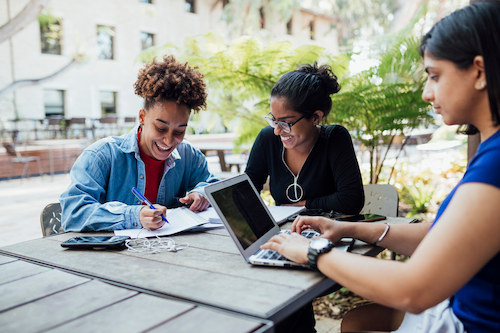By David Saxberg, our former Inclusion Advisor. 
A long time ago, I decided to study. I wanted to be a journalist. To learn my craft, I had to go to university. It was an uphill battle with the technology and documents to make sure I got the resources in a format that I could read and learn from. There’s a lot of preparation work you really need to do before you even sit down for that first lecture.
I would like to share my experience as a totally blind student when I went to Canberra to study from 2012 to 2016.
Getting to know the campus
One of the most important things I found was to spend time orienting myself on campus. Being comfortable in my location and knowing where I was made me more relaxed in class. It also made for a better learning experience.
Inaccessible PDFs
Most of the resources were in PDF, so it was a struggle to read them and to interact with them. I asked to get them in Word format and sometimes that was possible, however due to copyright issues it wasn’t always possible to convert them. So, I couldn’t read everything and I was at a bit of a disadvantage. By asking questions, writing some notes myself and having notes written for me by a scribe provided to me by the welfare and inclusion team, I was able to get most of my work done.
Developing good relationships
Speaking of the welfare and inclusion team, it is good to form a solid working relationship with them. When you need them to advocate for you on an issue that you are not able to solve yourself, having existing contacts is key to finding a solution. For example, when I requested information in an accessible format, and it wasn’t delivered in a timely format, I contacted my case officer at the welfare and inclusion team, and the issue was solved rather quickly.
For everything else, if I needed any help, I asked either the lecturers or the tutors to carry out any practical tasks. For example, at the time I had issues submitting my assignments via the online platform, so I directly emailed the lecturer explaining the situation and asked if I was able to directly email the assignments. Some lecturers weren’t open to this and I had to get the welfare and inclusion office to submit assignments online for me.
When it came to practical exercises in class, I was able to complete most of them myself but sometimes I asked classmates for a bit of help to complete the tasks. For example, they helped me find some text on a website because it wasn’t accessible.
My top 4 takeaways
A couple of key points that were important to me:
1. Research the university. Ask questions before you even get there and always explore all your options.
2. If you are blind or have partial sight, get mobility around the uni. Learn where things are, learn the transport to and from if you are living off campus and learn your way around campus accommodation if you’re living at uni.
3. Try and get to know your course lecturers and tutors if you can. Explain what assistance you require and the best possible way to provide it.
4. I found it helpful to maintain a good working relationship with the welfare and inclusion team. They were always ready to help me out.
You can read more about empowering students with disability in tertiary education in our recent article.


